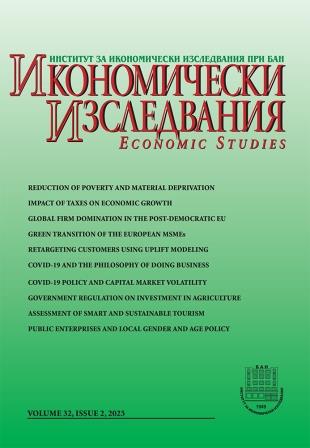Impact of Taxes on Economic Growth: An Empirical Study in the Eurozone
Impact of Taxes on Economic Growth: An Empirical Study in the Eurozone
Author(s): Alban Elshani, Lekë PulaSubject(s): Economy, National Economy, Business Economy / Management, Public Finances
Published by: Институт за икономически изследвания при Българска академия на науките
Keywords: Tax revenue; Economic Growth; Value Added Tax; Personal Income Tax; Corporate Income Tax
Summary/Abstract: This paper analyzes the effects of types of taxes on economic growth in Eurozone countries. Three of the largest types of taxes are taken into analysis, namely personal income tax (PIT), corporate income tax (CIT), and value-added tax (VAT). The data for the independent variables (types of taxes) and the dependent variable (Gross Domestic Product – GDP) from 2002 (since the creation of the currency union) until 2019 have been taken into consideration. A total of 306 observations are entered into the panel model and analyzed using a fixed effect regression. The purpose of this paper is to highlight which types of taxes can affect growth and the magnitude of their effect. Results reveal that personal income tax, social security contribution, and customs duties and excises have a negative effect on GDP in the Eurozone countries. Whereas corporate income tax and value-added tax have a positive effect. We also find that as the share of tax income in GDP increases, their impact on economic growth deteriorates. Based on the empirical findings, we recommend that policymakers should focus on Value Added Tax and corporate income tax in order to have an impact on economic growth. Extra care should be taken in personal income tax revenues and customs and excise revenues, revenues that negatively affect economic growth.
Journal: Икономически изследвания
- Issue Year: 2023
- Issue No: 2
- Page Range: 24-41
- Page Count: 18
- Language: English

